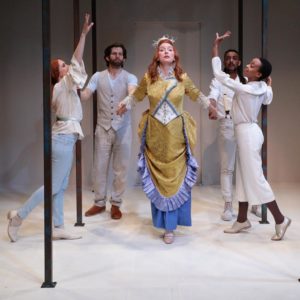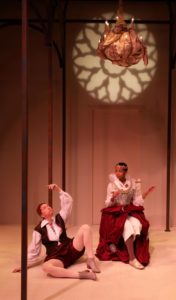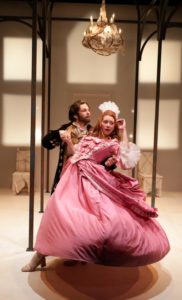
by Mike Hoban
From the novel by Virginia Woolf; Adapted by Sarah Ruhl; Directed by A.Nora Long; Scenic Design by Richard Wadsworth Chambers; Lighting Design by Steven McIntosh; Costume Design by Steven McIntosh. Presented by the Lyric Stage Company of Boston at 140 Clarendon St., Boston through March 25
At a time when the lines of gender identity are becoming increasingly blurred (in some corners anyway), the production of Virginia Woolf’s Orlando certainly seems like a natural choice for the Lyric Stage’s opener for the second half of the 2017-2018 season. Adapted by Pulitzer Prize finalist Sarah Ruhl, who also wrote last season’s gut-busting Stage Kiss (also at the Lyric) – arguably the best comedy of last season on any Greater Boston stage – Orlando makes for an entertaining evening, thanks in part to the charms of its enchanting lead, Caroline Lawton.
When we first meet Orlando (Lawton in a dual role) as a 16-year old boy, he’s doing boy things, namely, imagining that he is lopping off the head of an infidel. But he soon finds that he feels “the need of something which he could attach his floating heart to” and tries his hand at poetry, attempting (for a number of centuries) to write an ode to an oak tree. One day, the Queen of England (amusingly played by Hayley Spivey) comes to town. Being born to nobility himself, Orlando is introduced to Her Majesty, who immediately becomes smitten with him when she discovers, “By God! He has the shapeliest legs of any nobleman in England!” She brings him to her court, where he quickly becomes the object of desire for the ladies, eventually choosing to become engaged to one lucky lass.

But she is quickly forgotten when a beautiful Russian princess (a terrific Elise Arsenault, who also plays cello and served as the production’s music director), is marooned in town when the Great Frost of 1608 freezes everything in sight and traps her ship in the port. The two engage in a whirlwind romance before she skates away with his heart, leaving him broken. But like any good philanderer, he bounces back with a vengeance via a string of sexcapades in Constantinople, where he meets a gypsy woman. Following a tryst with her, he sleeps for seven days – and wakes up a woman, as we discover when we see Lawton’s nude frame silhouetted behind a sheet at the close of Act I. To quote Woolf herself, “Orlando had become a woman. There is no denying it.” And Act II (the more enjoyable of the two) consists of Orlando learning what it is to be a woman – albeit a wealthy and beautiful one, which is a significantly different reality than the alternative throughout the ages.

Lawton brings a lithe physicality to the role as Orlando as a boy/man, but really shines as she struggles with the mindset and movement during the transformation from a man to a woman over the course of three centuries. Director A. Nora Long keeps the action moving, and gets good supporting performances from the male members of the cast (Michael Hisamoto, Rory Lambert-Wright, and Jeff Marcus) in a number of roles. Richard Wadsworth Chambers set is spare but elegant, and the musical accompaniment by Arsenault is gorgeous. Lovers of language will appreciate Woolf’s beautiful prose, but others may find the third-person narration that denotes much of the action to be a bit wearing at times, particularly in the first act. Still, Virginia Woolf’s Orlando is a good take, particularly for fans of the author. For more information, go to: https://www.lyricstage.com/

